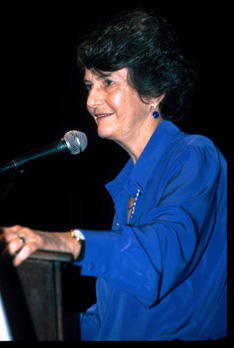1997 Albert Schweitzer Award of Excellence
On Tuesday, October 7, 1997, Dr. Helen Caldicott was on the campus of Chapman University to receive the Albert Schweitzer Award for Excellence for 1997. At a dinner just prior to the presentation of the award, Dr. Alice Bergel offered a moving tribute to Dr. Caldicott. She said, "May there always be a Helen Caldicott to prick our consciences as Albert Schweitzer did, and to enlighten the younger generation, as Dr. Caldicott will tonight."
Dr. Helen Caldicott has been an international advocate for peace and the environment for twenty-five years. The founder of Physicians for Social Responsibility and Women's Action for Nuclear Disarmament (WAND), Dr. Caldicott has been called a "peace warrior" because of her opposition to nuclear weapons and her devotion to the welfare of the planet earth. She has taught at Harvard Medical School, Children's Hospital Medical Center in Boston, and the New School for Social Research in New York. She has authored four books, Nuclear Madness, Missile Envy, If You Love This Planet, and most recently, A Desperate Passion, her autobiography. She was nominated for the Nobel Peace Prize by former Schweitzer Award recipient Linus Pauling, and she is the recipient of the Gandhi Peace Prize and the Margaret Mead Award. A film based on her book, "If You Love This Planet," won an Academy Award for best documentary in 1983.
After receiving the Schweitzer Award at Chapman University, Dr. Caldicott delivered a lecture on the topic "The Fate of the Earth in the New Millennium." The lecture was co-sponsored by the Chapman University Freshman Seminar Program and the Schweitzer Institute. Dr. Caldicott opened her lecture by warning that the world is dying, and that, as one scientist put it, we are producing the end of evolution. The threat of nuclear weapons is by no means past, she stressed, and the presence of toxic waste in the environment is increasing. Hence, she recommended, people should become aware of the issues and express their will, by voting and by contacting their political representatives, that military spending be decreased and commitments to the life of people and the planet be increased. Nuclear weapons, Dr. Caldicott stressed, are simply evil, and pointing at the bust of Albert Schweitzer, she said, "This man knew what evil means: Evil means destroying life. That is the definition. And Jesus, if he were alive, would say the same thing, and so would Buddha and all the other prophets." It is a great privilege, she concluded, to be alive, and we should cherish that privilege, and then we may be able to save the world.
In introducing Dr. Caldicott and presenting her with the award, Dr. Meyer addressed her in these words: "Dr. Caldicott, you exemplify the values of Albert Schweitzer in your distinguished career as a physician, with particular care for children, in your international campaign for nuclear disarmament and against nuclear madness, and in your continuing role as an advocate for peace and the welfare of the world."